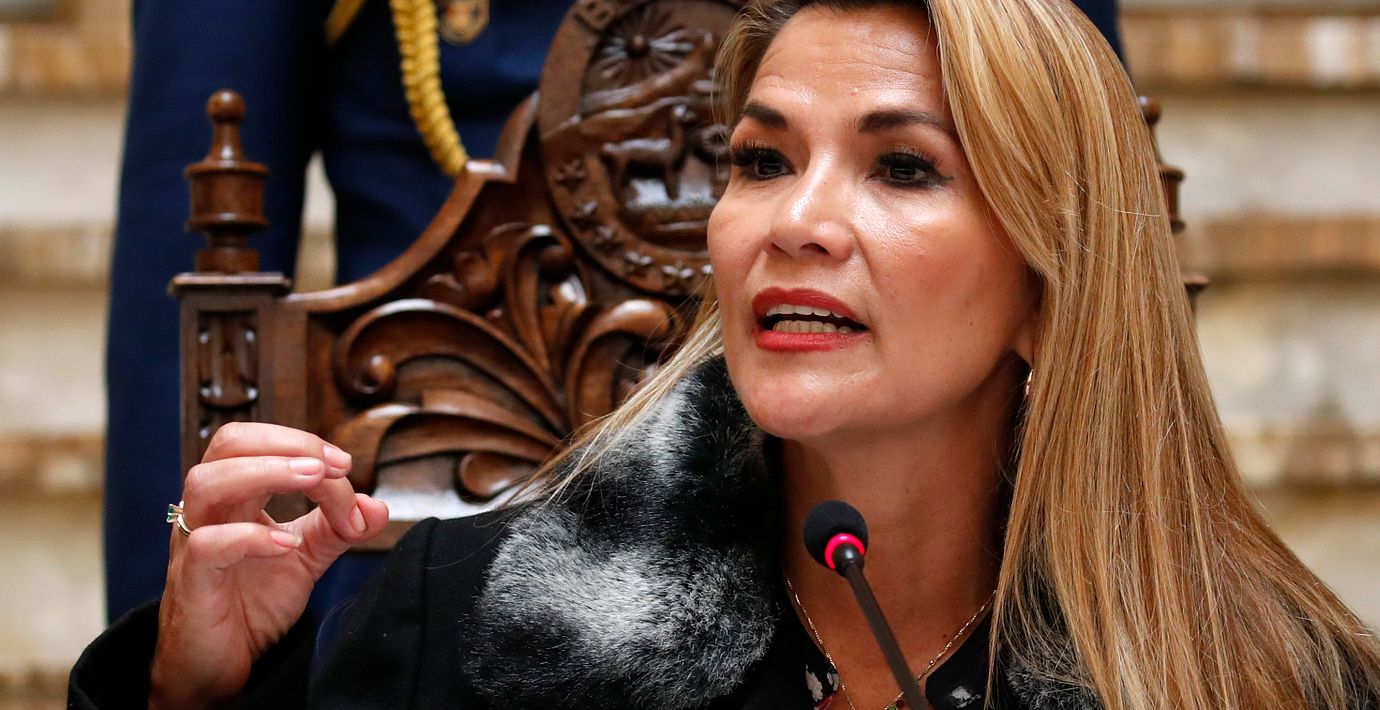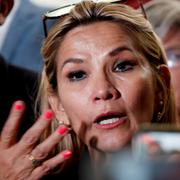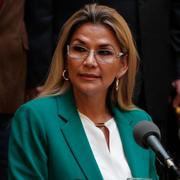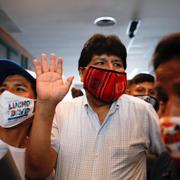
FN slår larm efter dom mot Bolivias expresident
Processen som lett till en tio års fängelsedom för Bolivias expresident Jeanine Añez är oroande. Det skriver FN-sändebudet Diego García-Sayán på Twitter.
I förra veckan dömdes Añez av en domstol i La Paz, anklagad för maktmissbruk i samband med en kupp mot den tidigare presidenten Evo Morales 2019. Men Diego García-Sayán, som är FN:s särskilda observatör av rättsväsendets oberoende runtom i världen, varnar nu för att processen var politiskt motiverad.
Añez är allvarligt deprimerad och har försökt begå självmord under sin tid i häkte.
Jeanine Áñez
Wikipedia (en)
Jeanine Áñez Chávez (Spanish pronunciation: [ɟʝaˈnine ˈaɲes ˈt͡ʃaβes] (listen); born 13 June 1967) is a Bolivian lawyer, politician, and television presenter who served as the 66th president of Bolivia from 2019 to 2020. A former member of the Social Democratic Movement, she previously served two terms as senator for Beni from 2015 to 2019 on behalf of the Democratic Unity coalition and from 2010 to 2014 on behalf of the National Convergence alliance. During this time, she served as second vice president of the Senate from 2015 to 2016 and in 2019 and, briefly, was president of the Senate, also in 2019. Before that, she served as a uninominal member of the Constituent Assembly from Beni, representing circumscription 61 from 2006 to 2007 on behalf of the Social Democratic Power alliance.
Born in San Joaquín, Beni, Áñez graduated as a lawyer from the José Ballivián Autonomous University, then worked in television journalism. An early advocate of departmental autonomy, in 2006, she was invited by the Social Democratic Power alliance to represent Beni in the 2006–2007 Constituent Assembly, charged with drafting a new constitution for Bolivia. Following the completion of that historic process, Áñez ran for senator for Beni with the National Convergence alliance, becoming one of the few former constituents to maintain a political career at the national level. Once in the Senate, the National Convergence caucus quickly fragmented, leading Áñez to abandon it in favor of the emergent Social Democratic Movement, an autonomist political party based in the eastern departments. Together with the Democrats, as a component of the Democratic Unity coalition, she was reelected senator in 2014. During her second term, Áñez served twice as second vice president of the Senate, making her the highest-ranking opposition legislator in that chamber during the social unrest the country faced in late 2019.
In the midst of this political crisis, and after the resignation of President Evo Morales and other officials in the line of succession, Áñez declared herself next in line to assume the presidency. On 12 November 2019, she installed an extraordinary session of the Plurinational Legislative Assembly that lacked quorum due to the absence of members of Morales's party, the Movement for Socialism (MAS-IPSP), who demanded security guarantees before attending. In a short session, Áñez declared herself president of the Senate, then used that position as a basis to assume constitutional succession to the presidency of the country. Her transitional government focused on pacifying the country, calling for new elections, and, later, combating the COVID-19 pandemic. Responding to domestic unrest, Áñez issued a decree removing criminal liability for military and police in dealing with protesters, which was repealed amid widespread condemnation following the Senkata and Sacaba massacres. Her government launched numerous criminal investigations into former MAS officials, for which she was accused of political persecution and retributive justice, terminated Bolivia's close links with the socialist governments of Cuba, Nicaragua, and Venezuela, and warmed relations with the United States. Though Áñez succeeded in conducting free and fair elections, her decision to launch her own unsuccessful presidential campaign led to criticism that she was not a neutral actor in the transition, and caused her to bear the brunt of the blame for the electoral victory of Luis Arce and the return to power of the MAS.
Following the end of her mandate in November 2020, Áñez briefly retired to her residence in Trinidad, only to launch her Beni gubernatorial candidacy a month later. Despite being initially competitive, mounting judicial processes surrounding her time as president hampered her campaign, ultimately resulting in a third-place finish at the polls. Eight days after the election, Áñez was apprehended and placed in preventive detention on charges related to her role in the alleged coup d'état carried out in 2019; a move decried as political persecution by members of the opposition. Áñez's extended incarceration at the Miraflores Women's Penitentiary caused a marked decline in her physical and mental health, and was denounced as abusive by her family. On 10 June 2022, after nearly fifteen months in pre-trial detention, the First Sentencing Court of La Paz found Áñez guilty of breach of duties and resolutions contrary to the Constitution, sentencing her to ten years in prison.
Omni är politiskt obundna och oberoende. Vi strävar efter att ge fler perspektiv på nyheterna. Har du frågor eller synpunkter kring vår rapportering? Kontakta redaktionen


